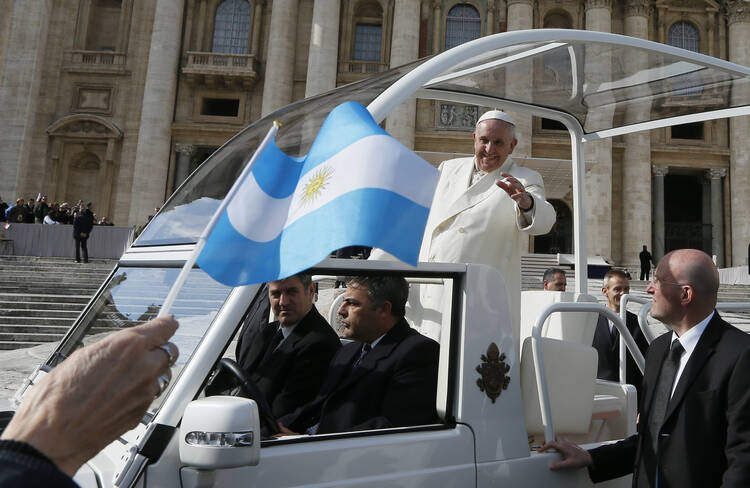Pope Francis is well known for his early resistance to Liberation Theology. Less well known is his vocal critique of capitalism following the Argentinian debt crisis of 2002. This week, thanks to the U.S. courts, Argentina may undergo its second debt default in a decade. While its impact on the debt of nations may turn out to be less than some fear, its impact on the poor may be more damaging, undoing more than a decade of debt relief begun by Saint John Paul II in the Great Jubilee of 2000.
The structural adjustment, that is, reprioritizing public expenditures away from public services toward debt payment for international creditors, following Argentina’s first default in 2002, awakened Archbishop Jorge Bergoglio to the injustices of the international financial system. “We are tired,” he said at the time, “of systems that produce poor people so that then the Church can support them.”
The argument of the Synod of America (1997-99) and of other church documents has been that swelling debt payments impeded the development of poor nations. “It cannot be denied,” the Synod declared, “that [international debt] has contributed to creating conditions of extreme privation which constitute an urgent challenge to the conscience of humankind. . . . Relief from debt will only begin to lift the burdens of the poor. Much more will have to be done to prevent the marginalization of whole countries and regions from the global economy.”
In the current situation, more than 90% of the creditors have agreed to take “a haircut,” a reduction in the balance due them in return for payment of the interest. But a handful of “vulture” hedge funds have refused to join the settlement, and the U.S. courts have said Argentina must repay the hedge fund-speculators in full before it repays those who have agreed to the resettlement.
Debt reduction for faltering poor countries have been a policy implemented by international lenders like the International Monetary Fund as well as creditor nations in the interest of justice and the stability of the world economy. The church, with NGOs like Jubilee Justice and singer-philanthropist Bono, has persistently worked for debt relief. To date, as a result of these efforts, $30 billion of debt relief for poor countries has been achieved.
The true danger of the default forced on Argentina by the greed of the vultures and the inflexibility of the courts is that the whole fabric of debt-relief mechanisms and the climate of common-good thinking that has enabled lenders to join in this global enterprise of responsible relief for the poor will be put in question. The greediest of speculators ought not be allowed to bring this system down nor erode the good will that made it possible.
Pope Francis told his friend Rabbi Avram Skorka, “Everyone thinks the church is against communism, and yet it is against communism as [much] as it is against the wild economic liberalism we see today . . . . No one should be dispossessed, and there is no worse dispossession—and I want to emphasize this—than not being able to earn one’s own bread, than being denied the dignity of work.” Without a retreat by the vultures or the U.S. courts, Argentina’s default is inevitable. There’s little doubt that it will invite a sharp critique from Pope Francis whose education in the failings of extreme capitalism began twelve years ago with Argentina’s first default.
Drew Christiansen, S. J., the former editor of America, is Distinguished Professor of Ethics and Global Development at Georgetown University.








